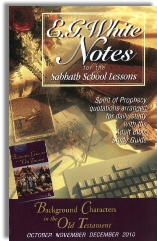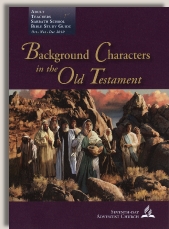|
||||||||||||||
Commentary on "Rizpah: The Influence of Faithfulness"
Day 6: Thursday, November 25, 2010 - Building a Nation
Overview
Today’s Lesson states that Rizpah’s faithfulness to her sons provided an example to David, to the Israelites, and to us, that inspires and motivates faithfulness. David was moved to act honorably for all the tribes of Israel by arranging a proper burial for the bones of the family of Saul. This in turn brought reconciliation to the divided tribes of Israel; they could now reunite again as one nation because of an act of faithfulness by Rizpah. By individual acts of faithfulness, the nation could be rebuilt. The Lesson concludes that “circumstances alone do not make or break a child of God…” It is our choices that determine whether we will be pawns or faithful influences to those around us.
Observations
The Lesson makes a good point that the faithfulness of Rizpah precipitated the proper burial of Saul and his family, and this in turn help reunite Israel. However, if that is the only lesson we can pull from this story, we have missed a major theme of the whole Bible: the awful price of sin and how God pays for it. The Lesson’s description of Israel’s reconciliation could have been told without a single mention of God, for God is only a background character in their story. A secular person could make the same arguments about how individual acts of good character provide an example that spreads to all of society. The faithful God is the center of this story, and all human faithfulness springs from Him.
God is both loving and just. The context of the story is set up in the first verses: there was a famine in the land because of the bloody house of Saul, and David asked the Gibeonites how to make atonement. The devastation inflicted by the house of Saul required atonement, and this atonement made possible the reconciliation that followed. Rizpah’s actions would have carried no weight or meaning if a blood atonement had not been made for the sins of her family. Not only Saul’s family, but the entire nation represented by their fallen king, desperately needed a clean conscience. This would not be accomplished by amnesia, good intentions, or money. The justice to be paid for Saul’s crimes must carry equal weight to the crimes, which is why Levitical law demanded blood for blood.
The deaths of the seven sons of Saul did not pay for their sins in an eternal sense. Although God answered their entreaties for the land after the bones are properly buried, the final payment for sin was not made. No sins are ever finally cleansed apart from the once-for-all suffering and death of the Messiah, who was the fulfillment of these shadows. The New Testament makes it clear that peace could not be brought to Israel outside of the chastisement of the Suffering Servant:
“He was wounded for our transgressions; he was crushed for our iniquities; upon Him was the chastisement that brought us peace…” Isaiah 53:5
Even though we are horrified by the thought of our sin requiring the blood of anyone, our revulsion is only a small taste of reality. Our worst fears are realized the Gospel, for there we behold the reality of our sin and God’s holiness. Our sins not only ruin lives, they outrage the just Creator. Habakkuk said to God,
“You who are of purer eyes than to see evil and cannot look at wrong, why do you idly look at traitors…?” Habakkuk 1:13
When Jesus was made to be sin for us, God was not simply pretending that Jesus had committed the sins of the entire world. When God, who is the creator of all things, and the ground of our being, makes you to “be sin” and a curse, you will feel that curse to the very bottom of your soul. That is because in an ultimate sense, you are a curse. Even though Jesus was perfectly free of sin, He felt the curse of God’s wrath in all its power. In the same way, when God declares us righteous in Christ, because of His once-for-all obedience, He is not just pretending. He is the ground of our being and the source of our life. So when He declares us as righteous as His Son, we can know the blessings of Christ’s blood to the bottom of our souls and live with a perfectly clear conscience. Even though we battle the impurity of our flesh, we are forgiven, completely and forever.
“There is therefore now no condemnation for those who are in Christ Jesus.” Romans 8:1
The sacrifice of Saul’s sons, who actually shared in his guilt, brought a temporary cleansing to Israel. The sacrifice of Jesus is eternal and total. He sends a clear message to all of us who are guilty but squeamish about all that blood: there is no cleansing of the conscience outside of the single, unrepeatable sacrifice of the Son of God. And the wonderful finality of that sacrifice secures many blessing for us. We can live free of guilt. We have bold access to the throne of grace in times of need (Heb. 4:16; 10:19). We are given victories over sin here and now. We have been ransomed from our futile ways of life through the precious blood of Christ (I Peter 1:18,19). Peace and reconciliation can only be purchased through Jesus’ blood.
Summary
- The message of this story shows the terrible price of sin and how God paid it, by an eternal sacrifice.
- The nation of Israel, like us, desperately needed a clean conscience from sin.
- Their reconciliation was temporarily accomplished by the blood of seven sons of Saul. Our reconciliation was eternally secured through the blood of Jesus Christ.
- Because Jesus was made sin for us, God was not merely pretending, for Jesus felt that guilt throughout His entire being. Likewise, when God declares us righteous, we are free indeed.
- Because Jesus’ sacrifice is finished and total, we can be guilt free, and have total access to God’s throne for help, and have victory over sin.
Copyright 2010 BibleStudiesForAdventists.com. All rights reserved. November 24, 2010. This website is published by Life Assurance Ministries, Glendale, Arizona, USA, the publisher of Proclamation! Magazine. Contact email: BibleStudiesForAdventists@gmail.com.
The Sabbath School Bible Study Guide and the corresponding E.G. White Notes are published by Pacific Press Publishing Association, which is owned and operated by the Seventh-day Adventist church. The current quarter's editions are pictured above.
Official Adventist Resources
Standard Edition Study Guide Week 9
Teacher's Edition Study Guide Week 9
Easy Reading Edition Study Guide Wk 9
Search the Complete Published Ellen G. White Writings


